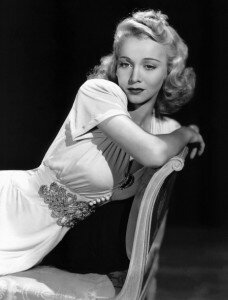 Carole Landis is known primarily as the bosomy blonde movie star who offed herself over Rex Harrison. Of all the schmucks who’ve driven ladies to leap, the idea of killing yourself over a tool like “Sexy Rexy” seems especially senseless. But in Hollywood’s Golden Years one of filmdom’s most glamorous and popular stars did indeed end her life over that Doolittle douche.
Carole Landis is known primarily as the bosomy blonde movie star who offed herself over Rex Harrison. Of all the schmucks who’ve driven ladies to leap, the idea of killing yourself over a tool like “Sexy Rexy” seems especially senseless. But in Hollywood’s Golden Years one of filmdom’s most glamorous and popular stars did indeed end her life over that Doolittle douche.
Today not many people have heard of Carole Landis, but her story is one of Hollywood’s most fascinating tales, with more twists and turns than her enviable curves.
Carole’s story begins in Midwestern Gothic luridness with a steady stream of heartbreaking details that make you periodically have to stop reading and go, “Seriously?!”, then sigh and warily dip in for more.
She was born Frances Ridste on New Year’s Day in 1919 in the aptly named burg of Fairchild, Wisconsin, to a farmer’s daughter and a “drifting railroad mechanic” who’d already abandoned the family before little Carole came along. (The “drifting railroad mechanic” wasn’t a stable family man? Quelle surprise!) Her mother was no saint either; Charles Fenner, her second husband, and the man with whom she’d been having an adulterous affair, was most likely Landis’s biological father. The youngest of five children, two of whom died in childhood, her early years were filled with poverty and sexual abuse.
Carole was such a beautiful infant she earned the nickname “Baby Doll”. According to family sources, she was sexually molested by a relative for much of her childhood. Given young Baby Doll’s shitty start in life, it’s no surprise that Carole 1) seemed much older than her years, and 2) was interested in being in show biz. Little Carole covered her walls with photos cut from magazines of movie stars like Mary Astor and Clark Gable. At age nine, little Carole ran up on stage during a local talent show and started to sing. Using make-up tricks to hide her age, she started entering beauty pageants at the tender age of twelve! (She won a pair of silk stockings and an electric heater. Who says beauty can’t buy you anything?)
In high school Landis often skipped class – “boy crazy ” was the general consensus. “I always seemed so much older than the other kids my age,” said Carole, “They seemed like tots.”
She was ahead of her classmates and ahead of her time. As a teenager she tried to form an all female football team at school, but the principal stopped her because it was “unladylike”. It’s not surprising that Carole dropped out of high school at 15 to get her whole show biz thing underway. She worked as a hula dancer in a San Francisco nightclub, she sang with a dance band, and she worked at a hamburger stand, a department store, a movie theater. She dyed her hair blonde and changed her name to “Carole Landis” after her favorite actress, Carole Lombard. She eventually saved up $100 and hightailed it to Hollywood.
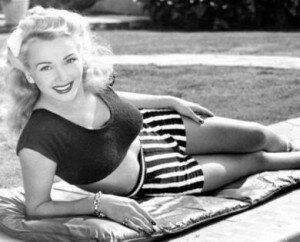
The Ping Girl
Her 1937 film debut was as an extra in the original film version of A Star Is Born. Next she found herself in various horse operas and an untold number of cheesecake photos. Eventually her cheesecakery paid off big; in 1940 studio head Hal Roach cast her as a scantily-clad cave girl in the original film version of One Million B.C.. Just as it would for Raquel Welch a quarter-century later, the movie made Landis a star. Soon, just as Clara Bow had been dubbed the “It Girl” and Ann Sheridan was crowned the “Oomph Girl”, publicists gave Carole the title the “Ping Girl.”
The Ping Girl moniker was attributed to a take-off on the popular motor oil ad at the time that claimed to take the ‘ping’ out of an engine and “make it purr”.
Some claimed it was a mash-up of PIN-up Girl. Some say it alludes to Carole’s erection-generating abilities, as in “I saw her and –ping!” Miss Hard-On of 1940 may have very well been aware of this etymology; once in an interview Landis said ‘ping’ was a term in Hollywood slang, but neglected to mention for what.
Most interesting to me about the whole “Ping Girl” thing was how brilliantly Carole (or possibly her PR folks) leveraged being against the sobriquet:
“I want a fair chance to prove myself something more than a curvaceous cutie. I want to get out of bathing suits and into something more substantial. Unfortunately the publicity department of my studio does not agree. They have conceived the brilliant idea of selling me to the public as ‘the Ping Girl’. This flash of genius is to be illustrated with a series of pictures out of their files, suggestive of anything but acting talent.”
Still, Landis was well aware that being pin-uppity had been her ticket to the big time:
“Leg art did the trick — naughty leg art, if you happen to look at it in that light. When the boys needed someone to pose in a skin-tight white bathing suit, go sleigh riding in shorts, or climb a ladder in a skirt, they’d yell, ‘Get Landis!’ That made everybody happy except, maybe, the goody-goods and the bluenoses, and I suspect they took a second peek now and then.”
Like a lot of women, Carole had a lot of ambivalence about using her assets to get ahead. She posed for cheesecake photos by the thousands, but then resented all the attention they garnered.
“Heaven knows I want people to think I have sex appeal. But I also want to think I have something besides sex appeal.”
God knows Carole was a smart cookie in every sense of the word. She loved to read, and was a fan of Ernest Hemingway, Noel Coward, and W. Somerset Maugham. (Hemingway gifted her with a set of personally autographed books.) But it was Landis’s more physical charms that got her places, both on and off-screen. She scored a contract with Twentieth-Century Fox, and was involved with studio head Darryl Zanuck, though it’s not entirely clear to me which came first, the chicken or the egg. She was in a series of successful films, playing second fiddle to Betty Grable in I Wake Up Screaming and Moon Over Miami. But she lost a pivotal role that ended up thrusting Rita Hayworth into stardom in the soapy bullfighter pic, Blood and Sand — very likely because she ended her affair with Zanuck. In fact, her ditching Darryl got her relegated to B pictures at the studio from then on.
When World War II came along, Carole traveled more than 125,000 miles, spending more time visiting troops than any other actress.
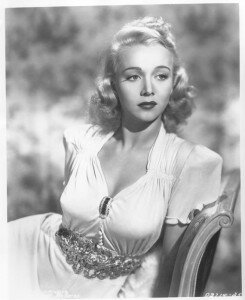 Landis dedicated herself to the war effort, taking time off from her career to tour the country selling war bonds and entertain soldiers all over the world — Australia, Brazil, Algeria, Bermuda, Scotland, England, New Guinea, Ireland, Guam, and New Zealand! She sang and jitterbugged with the boys, spent time visiting wounded soldiers, and wrote hundreds of letters to their families. Jack Benny said, “You soon forgot she was Carole Landis, the sex symbol, the Hollywood star, because she was a real human being and had a warm heart that spilled over with kindness.”
Landis dedicated herself to the war effort, taking time off from her career to tour the country selling war bonds and entertain soldiers all over the world — Australia, Brazil, Algeria, Bermuda, Scotland, England, New Guinea, Ireland, Guam, and New Zealand! She sang and jitterbugged with the boys, spent time visiting wounded soldiers, and wrote hundreds of letters to their families. Jack Benny said, “You soon forgot she was Carole Landis, the sex symbol, the Hollywood star, because she was a real human being and had a warm heart that spilled over with kindness.”
In conjunction with her ability to make Privates’ parts go ‘ping’, this no doubt added to her pin-up popularity with servicemen.
During a two-month tour of the South Pacific, Carole contracted malaria and amoebic dysentery. She almost died, and was hospitalized for weeks, never fully recovering from her illnesses. Landis became an Air Raid Warden, a commander in the Aerial Nurses Corps, and an honorary Colonel in the American Legion. Our girl even got her pilot’s license and eventually flew for the Civilian Air Patrol! She went on to write several newspaper and magazine articles about her experiences during the war, culminating in the 1944 book (later made into a movie), Four Jills in a Jeep.
She was quite the trooper, but despite the Ping and pin-up, Carole never made it to the top. The closest she ever got to an Oscar is when, as a presenter at the 1941 ceremony, she caused a commotion when the slip fell out of her dress. (I told you she was a smart cookie.) She did make it to Broadway however, working with Jacqueline Susann in the 1945 musical fittingly titled, A Lady Says Yes. (In fact, Jacqueline and Carole said yes to Sappho; the two were lovers. In fact, the character of Jennifer North in Jacqueline Susann’s infamous 1966 novel was based on our Baby Doll.)

Ping!
“Let me tell you this: Every girl in the world wants to find the right man, someone who is sympathetic and understanding and helpful and strong, someone she can love madly. Actresses are no exception; the glamour and the tinsel, the fame and the money mean very little if there is hurt in the heart.”
Carole just never got a break on the romantic front. Abandoned by both her stepfather and father, she spent most of her life desperately searching for a daddy. The “boy crazy” teen grew up to be crazy when it came to men. (And I guess women; let’s not forget Ms. Susann.) In 1934, 15-year-old Landis married her 19-year-old neighbor, Irving Wheeler; the marriage was annulled a month later but after six months they remarried. But, they were divorced less than four years later when Irving named infamous director-choreographer Busby Berkeley in an alienation of affections lawsuit. Busby ended up proposing to Carole a year later, then broke it off. She went on marry “yacht broker” Willis Hunt, Jr. but ended up leaving him after 2 months. (She said he was “sarcastic”. I shudder to think what shitty behavior came under that seemingly innocuous umbrella.) While touring for the troops, she met and married Army Air Corps Captain Thomas Wallace in London, divorcing him a couple of years later. In 1945, Landis married the extraordinarily named Broadway producer W. Horace Schmidlapp, but this marriage also only lasted a few years.
“Glamour girls are suckers! You might rightly hail me, ‘Hi Sucker!’ because, as the nicks on a gun indicate how many men a killer has got, nicks on the heart of a glamour girl indicate how many men she didn’t get! There is very little I can do about it, either. Being a glamour girl doesn’t help any. I can only do what other girls do, cry my eyes out at night, hope and pray, pretend I don’t care, do the best acting job of my career for the benefit of friends and family, for the sake of my own pride.”
A psychic once warned Carole that she “must beware of emotional entanglements with men you can’t entirely possess.” If only she’d heeded that warning.
You are probably most aware of actor Rex Harrison for his roles in My Fair Lady, Cleopatra and Dr. Doolittle. He came to Hollywood in the mid-forties and was almost immediately dubbed “Sexy Rexy” due to his 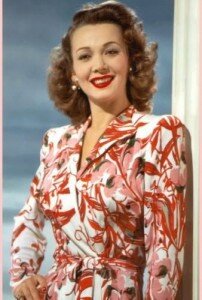 philandering ways and the apparent hotness that made the fair ladies drop like flies. Sadly, one of those ladies was our poor Baby Doll. Married at the time to his second wife, actress Lilli Palmer, Rex broke Carole’s heart when he wouldn’t get a divorce. (Of his many marriages,Harrison said, “Wives are like gilt-edged stocks. The more you have, the greater your dividends.”)
philandering ways and the apparent hotness that made the fair ladies drop like flies. Sadly, one of those ladies was our poor Baby Doll. Married at the time to his second wife, actress Lilli Palmer, Rex broke Carole’s heart when he wouldn’t get a divorce. (Of his many marriages,Harrison said, “Wives are like gilt-edged stocks. The more you have, the greater your dividends.”)
Someone commits suicide every 14 minutes; killing oneself is not uncommon. There are a lot of reasons people commit suicide, but for me it really boils down to one: a painful hopelessness that things won’t get better. Maybe that’s why it seems particularly tragic when someone with so much to give and look forward to snuffs out her life. It’s so final. But the pain of heartache and loss can be hard to bear, and it can make sad and desperate girls do sad and desperate things.
Born on New Year’s Day, Carole died on Independence Day, 1948. She was only 29. She spent her final night in this Earth with Dr. Douchebag, and the next day he was the one to discover her dead body on the bathroom floor. Harrison waited several hours before he called a doctor and the police. When the police arrived he insisted he was just friends with Carole. According to some sources, Landis left two suicide notes, one for her mother and the second for Harrison who instructed his lawyers to destroy it. (During a coroner’s inquest, Harrison denied knowing of any motive for her suicide and of the existence of a second suicide note.)
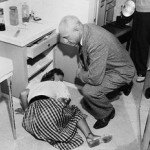
Rex found Carole’s body in the bathroom.
Carole was interred in Hollywood’s Forest Lawn Cemetery. The stars at her funeral included Van Johnson, Cesar Romero, Pat O’Brien, Rex Harrison, and his wife.
Whenever I’m tempted to look fondly on the parade of urbane and rakish rats that serially seduce girls on and off-the screen (I’m looking at you, Hugh Grant), Carole’s story reminds me of the often tragic consequences of their charm.
I confess, as supercilious misogynist dicks go, I do love me some Henry Higgins. But aside from the fact that he punched Frank Sinatra in the face and once remarked that The Sound of Music was “The only time I’ve ever rooted for the Nazis”, there’s little to recommend Mr. Harrison. (Sometime look up how he left wife Lilli to hang with Kay Kendall, expecting to get back with Lilli after Kay passed away from cancer. Lilli wasn’t into it.)
Landis’s official web site — run by my pal, and Carole’s great niece, Elizabeth Ann — questions the events of Landis’s death and the coroner’s ruling of suicide. The Landis family is convinced that Rex Harrison murdered her to avoid scandal surrounding the affair they’d been having. “Aunt Carole’s death has haunted my family for 62 years, and knowing Rex Harrison never paid for what he did only makes it worse,” explains Elizabeth Ann. “We may never know the truth about her death but we do know that the official version just doesn’t make sense.”
As far as I’m concerned, he’s the culprit either way.
I just hope Carole Landis is somewhere, her warmth, feisty spirit, and erection-impelling ways intact. To paraphrase the , “And the Angels Ping…”
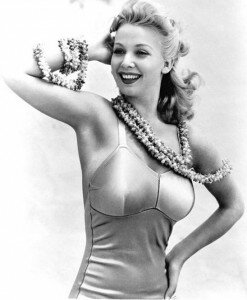







Thank you Dixie for writing such an amazing tribute to Carole! She was such a beautiful person and she had a huge heart. It is a real tragedy she never found any happiness but it’s wonderful that people are still discovering her.
- Carole was my all time favorite actress. – I dyed my hair blonde and tried to be like her. – She answered my fan letters. – I loved her dearly and will never forget seeing the newspaper with the photo of her on the floor. It broke my heart.
A sad story which I have read about before. It is tragic, to say the least, and I remember reading of her death when I was just a little kid. I can’t tell you why I remembered it or why it affected me but somehow it did, probably because of her youth and fame and the inexplicable act of sucide. For many years I never thought of it again until the late ’70′s when I came across a biography of the life of Rex Harrison and the Landis death was referred to from Harrison’s perspective. As a professional artist I created a portrait of Carole and contacted the person who created Carole’s website. Upon seeing the finished portrait she immediately ordered a print and published it on the site for other fans to see. It was very gratifying to hear of the responses of fans. I hope the unanswered questions regarding Carole’s death will ultimately be made known.
Carole seems to have been a really wonderful lady. I was not aware of this amazing lady until I stumbled upon one of her movies.
I found her on TCM one day, (which I hope will dedicate a day to her, she deserves it.)and she now has a place in my heart. When I read her story, it made me very sad to think that she took her own life over such a rotten human being as Rex Harrison. He wasn’t worth it; on any level. Poor Carole, so much heart, & soul to give, and no one to return it. She overcame so many challenges in her life that would have knocked down a lesser person. All the miles she logged during WWII was a testament to her big heart. It’s too bad she never found Mr. Right. I’m sure she would have been a very loving partner.
I hope that you found peace, sweet lady. Rest easy knowing that there are still people out there who love you, for being you.
Roger, what a sweet man you are! I’m sure somewhere Carole’s aware of your empathy and kindness and is the better for it. (As are you!)
Thank you for a great tribute to a beautiful and talented actress , gone too soon. At 65 I have returned to University to study my life-long passion, film history. Your writing shows compassionate insight into the tragic life of this woman.
Deb, thank you so much for the kind words! And a big juuuuicy thanks for going into film history! We need more people like YOU! You are such an inspiration! Would you like to write a guest blog post on your favorite movie dame?
I would love to!!…as soon as I decide which one of those great “Dames” is my favorite!
Deb, it can be ONE of your favorites! Or one of your not-so-favorites. Or do more than one.
Rachel Roberts also ended her life over Rex Harrison. Apparently, he had some kind of magic, albeit very bad magic, with the fairer sex.
Neil, it’s so upsetting to learn he worked his Sexy Rexy game on another lovely dame.
Dixie…where do I post a “guest blog”?…:)
I loved Rachel Roberts, but she was a complicated bundle of insecurities and unhappiness, and her suicide happened 9 years after her divorce from Sexy Rexy. Yes, there are reports that she attempted to win him back shortly before she ended her life, but I think it’s unfair to say that Rachel Roberts killed herself over Rex Harrison. I think it might be more accurate to observe that certain vibrant but emotionally fragile women seem to be attracted to narcissistic pricks like Rex Harrison.
Meg, that is so very insightful, and so sadly true. Ultimately, we’re responsible for our own choices, craziness, and blindnesses. Giving up hope and life for a man is always a tragic mistake, and heartbreaking no matter how you like at it.